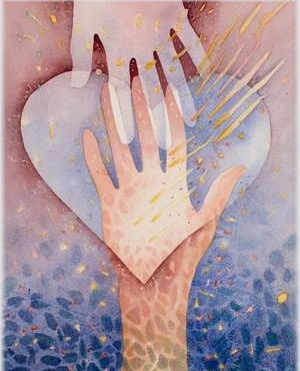 |
|
|
Where love is present, hope can blossom. |
|
HOPE, HOPELESSNESS, AND THE POWER OF LOVE |
|
Guruji-Ma |
|
|
It is often believed that despair is the opposite of hope, and this is, for the most part true. But even truer is the understanding that hope's opposite is the absence of love. For where love is present, even to a small degree, there also hope can blossom. And while it may not be felt as an emotion in any given moment, the bonds of love create a joining at a level beyond feeling which can uplift the one in sorrow and allow them to feel that it is possible to go on, with no other reason for doing so than life itself. The loss of hope can be produced by any number of circumstances that are painful and that seem endless and without relief of a substantial kind. In the presence of great pain and difficulty for which relief is sought, longed for, prayed for, and for which no assistance seems possible, the loss of hope is understandable, even natural according to the repertoire of what human beings ordinarily experience within embodied life. This response to pain is part of the human experience and it is only transcending the human experience through the power of love, that makes it possible to continue on in the presence of such severe circumstances. The embodied self may be experiencing great loss, depression, helplessness, and a desire to give up. At the same time, another part of the self – invisible, silent, yet strongly present in the background – may insist that the self not give up, that there is a reason to continue on. This inner strength and knowing comes from the level of the soul or higher self. It is a part of the self that is connected to love and to the roots of love which prompt it to always affirm the value of life and the meaning of every experience within life, whether or not the conscious self can perceive such meaning. Where the soul can transmit the sense of its own love for God, for others, or for the earth to the embodied self, then the self that is suffering and feeling hopeless may continue to do so, but may also feel that it is possible to endure a little longer, to manage just a little longer, because love creates its own motivation and gives importance to life, even when life itself doesn't seem to give itself importance. The permutations of love are many within the human heart, and what stands as the source of motivation for enduring may be the love of a child, of a parent, of a partner, of a friend, or of a task that still remains to be done. However, beyond any of these is the greater love of the soul for God which, in many souls, allows them to endure through great hardship and suffering because of the motivation to accept the conditions that life has presented, knowing that all things are somehow held in God. When love of sufficient strength such as this is present, then the task of the human self is one of getting through the difficulty, of enduring or surviving, supported by a desire built into the motivation of love that one not give up. The passage through hopelessness is one of the most severe trials that a person can endure, and the pain that it produces within the heart more difficult to sustain than physical pain. And yet, if one can believe in the reality of life's sacred origin and benevolent qualities, and hold faith with the power of the soul to convey something to the heart and mind other than hopelessness, then the time of trial can be gotten through and the time and space can be given for the heart to mend. There are some conditions that are part of the human experience in which it often seems to the human heart that no amount of time can heal the wound that exists because it is too deep, and because it is of such a nature that it cannot be corrected or redeemed in any way. This is true of certain wounds – they can, in some cases, be carried for a lifetime. Nevertheless, carrying a wound is not the same thing as being hopeless, and the value of life, and the joy in life can take place even for the wounded, even for those whose emotional scars are very deep. It is also true that within the spiritual unfoldment of every soul, the experience of awakening to God's love can heal all that seemed impossible to heal, and uplift all that has been carried as a heavy burden. What is necessary during a trial of hopelessness is to have faith in the possibility of another way of looking at things, another way of feeling about things than the one currently being experienced. This willingness to hold an alternate point of view, no matter how flimsy such a perspective might feel, allows a small amount of space to surround the pain one feels so that the light of the soul and the light of God's love can act as healing forces to the embattled heart, and enable the human self to come once again to a place of life and of renewed hope. Within this place, one can feel that more is possible than seemed possible a moment before, and that more can be hoped for than the heart had believed.
Related Writings: Meditations on Hope and Transformation The Healing Function of Divine Love
Article Section - Purification |